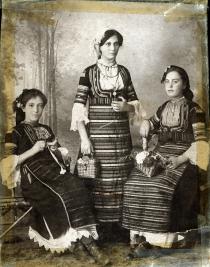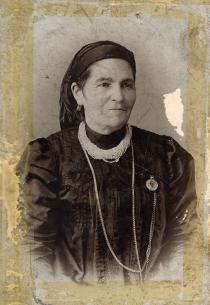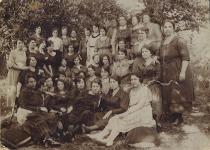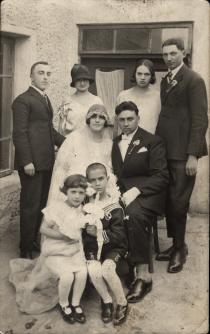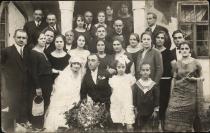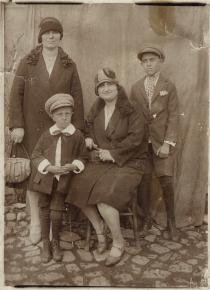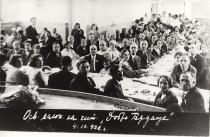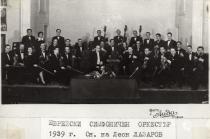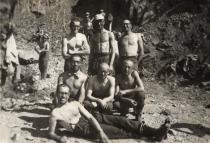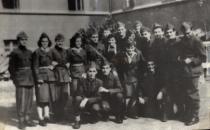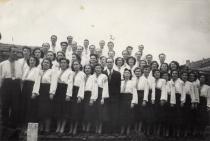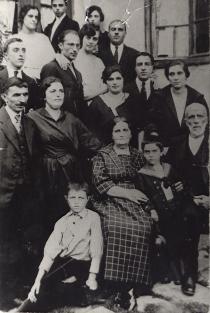
Leon Lazarov
Sofia
Bulgaria
Interviewer: Leontina Israel
Date of interview: July 2003
Leon Lazarov is a pensioner. He lives with his wife Stella in a large apartment in the center of Sofia. The walls of their apartment are all covered with family photos in which their children are smiling, as well as with posters for the forthcoming concert of their elder son, an electronic music composer, along with his students from the New Bulgarian University. There are also paintings of one of their grandsons - an artist, whom they are both very proud of. Leon Lazarov's wife is very hospitable and she spread all kinds of delicious sweets on the table in order to make us feel more comfortable during the interview. She takes care of her husband also, as he is partially immobilized. Nevertheless, he has preserved his lively spirit and good sense of humor despite the circumstances. He has a large press clipping on the choirs he has participated in, carefully arranged in a notebook, which is extremely valuable to him. He eagerly follows the inflow of new editions on Jewish history and in Ladino, and regularly buys them. There are several wooden, plastic art works in the living room, as well as a table, wood-carved by Stella Lazarova's father. Leon Lazarov's most vivid memories are connected with his childhood years. His life is connected with music which he considers his true vocation. The Lazarovs have two parrots. Leon gladly spends his time with them, as they make him very happy, and he treats them like his own children. At the time of the interview there was a calm and pleasant atmosphere in the house, complemented by the melodious hourly ringing of the old-time clock on the wall.
My family history
Growing up
Going to school
During the War
After the War
Glossary
I was born on 8th February 1918 in Kjustendil [a town in Western Bulgaria]. It's a beautiful town at the foot of the Rila Mountain where some 15,000 citizens lived at that time. It was like a garden and we all loved it very much. Not only that it was our hometown, but it was one of the most picturesque spots in Bulgaria. I haven't been there for a very long time, but people say that it's still a very pretty place. I remember the period when the fruit-trees would bloom - there were lots of apples in Kjustendil - and the whole town was covered with white blossoms, and we - the children - used to climb Hissarluka [a hill near town] - to gaze at the unspeakably beautiful, colorful spring landscape.
There were some 1,000 Jews in Kjustendil at that time. We didn't live in a separate quarter though, unlike the Sofia Jews, for example, who inhabited Iuchbunar 1. Actually there was something like a Jewish quarter - it was more like a place inhabited principally by Jews. It was called Kainarluk and was close to the marketplace. I guess the reason it was a 'Jewish' place was the fact that most of the Jews, who lived there, were tradesmen. The rest of them spread all over town. Bulgarians and Jews lived very, very harmoniously. People used to be tolerant and well-meaning.
Our kin, the Lazars, as our family was known at that time, is a very old Kjustendil family. We used to live in a house with my paternal grandparents. My paternal grandfather's name was Aron Solomon Lazar, but everybody used to call him Bohor and that's how it remained [in Ivrit: bechor - the eldest, first-born son]. My grandfather was the oldest person in the entire Jewish community in Kjustendil and he was treated with due attention and respect. Many of the Jewish families gathered at our place during the biggest Jewish holidays. Usually some 30 people would gather in the small entrance hall of our house. My maternal grandparents used to join us as well, as they lived in a village, in order to visit the synagogue and spend the holidays with us.
My father's grandfather Solomon, my great-grandfather, lived in Sovoleno near Kjustendil, and he was well-known for having a bakery, in which he roasted blue plums with walnuts. When I was a kid we used to visit him during the season of plums and bake them in the bakery, known as 'Diado Solomonovite' bakeries [The bakeries of grandfather Solomon].
My paternal grandfather Aron Solomon Lazar was born in 1860 in Kjustendil. I don't know if he ever attended school, but he was very talented and was a very respected man. He had a small shop in Kjustendil, in which he used to work with my father and his other son. At home he used to speak with granny and us only in Ladino. He had three brothers - Yosef, Ruben and Yako - but I don't remember anything about them. I don't even recall having met them. I remember one of them coming to visit, but for what reason and from where - I don't know. I was very young at that time.
My paternal grandmother's name was Sara Lazar, nee Mevorah. She was born in Kjustendil, too. I hardly remember her. In my memories I see her with a checkered dress. My maternal grandparent's family was an example of a good family. I think she had an older sister called Lialu. My granny and my mom took care of the house. When I moved to Sofia along with my mother, my father and my brother, my paternal grandparents remained in Kjustendil.
My father Nissim Bohor Lazar was born in June 1888 in Kjustendil. He had two brothers - Mordehai and Efraim - and three sisters - Oro, Sofi and Viza. They were all born in Kjustendil. My father was a very strict and just man. I had respect for him. I remember when I was a child he used to give me two levs in order to buy some sweets. Although, instead of buying sweets I used the money to gamble. There was a special place where one could play roulette, and I usually laid down all the money I had. It was a smallish sum but it often happened that I lost all of it. When my father realized this, he became angry about it and made me promise him that I would never ever gamble again. I did promise him this and so it remained. Even today I wouldn't play cards and I have never regretted that.
Mordehai Bohor Lazar, one of my father's brothers, was born in 1894. He was a doctor. He married a Romanian Jew. During World War I, my uncle went to Vienna in order to study medicine. Later he moved to several other countries so as to finish his studies depending on where it was cheaper for him to do so. I don't know exactly where he met his wife - whether in Romania or at some other place. His wife's name was Bliumeta and we, the kids, used to call her 'Bliumeta-who-knows-100-languages'. She had a gift for learning languages. She learned Ladino in a few months only and she spoke it like a native [Iuchbunar] woman. They didn't have any children. My uncle Mordehai was a very respected doctor. He lived with his wife in Kjustendil. Sometimes they used to travel to Romania to visit her family there. He was a very nice man - he often treated people completely free of charge because he knew how poor they were, yet how much they needed his care.
My father's youngest brother was Efraim Bohor Lazar, with whom my grandpa and my father used to work in the little shop they had in Kjustendil, and later in Sofia. He was born in 1900, his wife's name was Buka. They have a daughter called Selina Alfandari, nee Lazar and a son called Hari Lazar. Like most of the men from our family, Hari is a musician as well. He played the piano. When he grew up, he became a composer and moved to Argentina, as far as I can remember.
My father's eldest sister Oro Bohor Samokovliiska was born in 1885.. Her husband's name was David Samokovliiski. I have four cousins, their children: Buka, Albert, Isak, Josef. I think originally their family name was Cohen, but given the town he used to live in [Samokov], he became Samokovliiski. I remember that on some holidays during a prayer in the synagogue, the chazzan warned the Cohenims and the Levits to stay outside excluding just one person who would be designated to read the prayer. My uncle David usually was the chosen one. There was such a tradition.
My father's second sister Sofi Bohor was born in 1897. Her husband's name is Sabetai and they have two sons: Nissim and Hari, who live in Bulgaria and are doing pretty well.
The youngest sister Viza Bohor was born in 1903. Her husband's name was Rahamim, and their children are Mati and Motzi. At that time women didn't have a job, but took care of the house and the children.
My father's brothers graduated from high school in Kjustendil. His sisters had probably finished junior high school, although none of them worked. We kept close relations with my paternal relatives. We always gathered on holidays; I grew up together with my cousins. None of us was very religious. We observed all the traditions without being fanatic.
I guess my father's childhood wasn't an easy one. He graduated from junior high school and at the age of 13-14 he had to start working. His father, my grandpa Aron, participated in the wars - World War I and the First Balkan War 2 and he was even wounded, so my father had to support the household. As far as I know they observed all the Jewish traditions like we continued to do when my paternal grandparents were old and my father became head of the family.
My mother's kin is also from Kjustendil. Her parents and my maternal grandparents, Chelebon Bohor Sarafski and Amada Sarafska, lived in a village in Kjustendil district called Granitsa. My maternal grandfather was one of the few Jews who worked in agriculture. At that time Jews dealt mainly with trade, by tradition I suppose, and you would rarely come across a farmer of Jewish origin. My grandpa was born in Kjustendil on 29th December 1876. He had one brother - Menahem Bohor Sarafski, who was also born in Kjustendil. I don't know anything else about him, though. There was a place - it might have been inherited - near Granitsa, where he used to visit, wearing his fur cap, his belt, his leggings. There he used to plough, sow and grow fruit-trees. I remember the vacations when my brother and I along with a company of friends went to that village, five to six kilometers away from Kjustendil and we had a wonderful time there. At that time, in the area around Granitsa, there were some vineyards - perhaps they also belonged to my grandfather because they are still known as 'Sarafskite lozia' [the Sarafski vineyards] They were named after my grandfather. I don't know whether they still exist today. Nowadays everything is so rapidly changing, and I haven't been there for a very, very long time, yet I do remember that people used to call the area like that.
My maternal grandmother Amada Sarafska died very early and I have almost no memories of her. I know she was buried in the Jewish cemetery in Sofia, where all of them rest in peace together - my father, my uncle David, and my granny Amada.
My mother's name was Sara Chelebi Lazar, nee Bohor. Everyone used to call her Buka though, in Ivrit - bechurah - 'first-born daughter'. She was born in Kjustendil on 20th December 1894. My mother was an extraordinarily beautiful and patient woman. I still recall, even today, how she examined me on my droshe [bar mitzvah speech]. The speech was written in Ivrit in an elevated style and I couldn't understand a single word of it. It was written by a cousin of my granny. I had to learn it by heart, and that wasn't easy at all. My mother spent hours with me in order to help me, with all the patience only a loving mother can show.
She had two brothers - David Chelebi Bohor, born on 31st December 1905, and Isak Chelebi Bohor, born in 1908. David was a trader and I remember that when he moved to Sofia, he owned a delicatessen store on Targovska Street [Trader's Street], as it was named at the time. His wife's name was Ana. Isak's wife was Estrea. Isak was a trader.
My mother also had two sisters: Sofi Chelebi, born in 1894, and Liza Chelebi, born in 1903. They moved to Israel after the end of the war [WWII].
I have no idea how my mother and my father met. They must have been friends; they are from one and the same town, which is not so big, after all. They got married around 1914. Like all Jews at that time, they had a religious marriage. Before my birth they had another child, whose name was Aron. I suppose those were very hard times. My father took part in all the wars: the Balkan War, the Inter-Allied War [see Second Balkan War] 3, and World War I, and my mother was home alone. Their son died only a few months old and it was a great tragedy. Then I was born in 1918, and a few years later, in 1923, my brother Solomon followed.
There was a wonderful synagogue in Kjustendil, one of the oldest in Bulgaria. It was built before the Sofia synagogue [see Great Synagogue] 4 There was a chazzan, who performed all the functions in the synagogue. Later he became chazzan in Plovdiv. We didn't have a rabbi. At that time there was only one rabbi in the country - Daniel Zion 5, who was in Sofia. Sometimes he used to come to Kjustendil and there was always a big celebration on that occasion. Daniel Zion was the person who led the protest manifestation on 24th May 1943 6.
Our chazzan was a very interesting person. He had a grinder's workshop near the synagogue, where he used to work, when he wasn't engaged with the synagogue. He also had two crossed swords hanging on the wall. He had chosen five to six children, including me, who were supposed to accompany him and sing during the services in the synagogue. The other children weren't very serious about this, therefore finally only his son and I remained as singers. Thus I learned all those beautiful songs and I still love listening to them and I still feel inspired by the songs that I, myself, used to sing once. Sometimes the chazzan added the words of one song to the melody of another one, and the result was very interesting. He had a talent for that and people loved him. His son and I were raised with these melodies. For us children, there was a special place in the back of the synagogue and after the Friday prayer we used to go and kiss the hand of the oldest person, and that was usually my grandpa. We had a shochet, who provided kosher meat for us. When he passed away, the chazzan's son became our shochet - he was called a 'religious slaughterer'. I was of the same age and we kept very close relations.
My family wasn't very religious, yet we observed the traditions - everything was done the way it had to be done! We kept kosher very strictly. My mother and my granny used to cook very deliciously! They prepared all kinds of Jewish delights - pastels and so on. They also cooked zelnik. I don't know how they made them - with spinach, cabbage, onion, or whatever, but they were really tasty. We used to go to the synagogue on holidays because I used to sing in the choir and I had to be present there in order to perform my duties. We didn't observe Sabbath, because Saturday was a market day in Kjustendil and we had to work in the shop we owned. We couldn't afford losing our clients exactly on this day, because the clients on Saturday were the greatest in number and the most regular ones. We simply had no choice. My father, my grandpa and my uncle took turns working on Sabbath, so that there could always be one of them present in the synagogue.
We celebrated Pesach at home. Lots of guests used to come, as my grandfather was the oldest among the Jews. They all came and brought everything they had prepared for the holiday, and that is how the table was always covered with various dishes. We gathered around 30 people in a small room in our house. When I grew up, I went to Kjustendil to see my father's house and I was honestly surprised how we managed to gather so many people in such a small room! I don't remember us feeling uncomfortable or anything like that. These are some of my best memories. My grandfather used to read the Haggadah, and all the boys, as it had to be, wore kippot. In the evening we were sent to gather some grass, which we brought to our grandpa and he covered our heads with it, in order for us to grow like it. That was a beautiful tradition!
Rosh Hashanah is in fall and we used to gather when the weather was nice. Moreover, at that time of the year there was always something to harvest in the yard. Especially for this holiday my mother used to prepare a sweet meat 'Cieti Cielos' - in Ladino 'Seven Heavens' - and all the children dreamt of it impatiently. We were spoiled by having any kind of sweets prepared at home, yet, that one was the most special ones. I don't know how they made it, but it was absolutely delicious.
Purim was one of the most joyful holidays for us children. We disguised ourselves and went about the houses of our friends and relatives. We carried small pouches and everyone used to drop small coins in them. We spent our money on sweets. The idea was that no one was supposed to recognize us under the masks but, of course, everybody did. Then we ate mavlach - a special cake typical for this holiday.
Las Frutas [Fruitas] 7, the holiday of fruits, was also a wonderful one. We went from one house to another, like at Purim, but this time with larger bags, in which people used to put fruits, not money. People dropped whatever fruit they had in their gardens - some would drop walnuts, others would drop a pear, an apple, a plum, even hazelnuts were already ripe. In our yard especially there was a large variety: peaches, apricots, etc.. There was always something to pick.
During the Bulgarian holidays there was something very interesting happening indeed. We were on very friendly terms with our Bulgarian neighbors, lived in togetherness and complete harmony. At Easter, for example, as it usually coincides with Pesach, our neighbors used to give us painted eggs and Easter cake, and in exchange we gave them our Jewish brown eggs for Pesach and burmoelos 8. We exchanged them right through the fence. In my childhood years and even later, I never experienced any kind of anti-Semitism. Often, as we grew older, my friends from Kjustendil, who weren't only Jewish, but Bulgarian also, and I used to go on short excursions to the mountains. I had never gone to the sea though, not until the time I came to live in Sofia and became a student. Until then we had only heard of places like Varna and Bourgas [Bulgarian port cities on the Black Sea].
My grandpa, my father and his younger brother Efraim had a small shop in Kjustendil. It was a little place, perhaps only ten square meters, but we sold everything there. It was a grocer's. We sold salt, pepper, rice, etc., and in the remaining part of the narrow space we sold clothes. There were for example 'shamii' - kerchiefs that the villagers used to cover their heads with, while working on the field. In summer those kerchiefs were white and in winter black. Red belts that men used to wear around their waist at that time and dress materials for women were also sold. My father, my grandpa and my uncle provided the shop very regularly with all the necessary stuff in order to keep their clients. It was a universal shop so to speak - from a grocer's to a textile shop.
In Kjustendil the market day was Saturday. And you could always tell when it was market day! Villagers came to the town to sell their products - liubenitsi [water melon], cabbage, eggs, cucumbers, etc. When they managed to collect a little money, they came to our shop to buy some necessities - salt, rice, clothes and sweets for their wives and children. Everyone knew my grandpa - not only in Kjustendil, but in the whole region. The Bulgarians used to call him Bore. I guess, it sounded more familiar to them in this way, as it resembles the name Boris, which is popular in Bulgaria. Not only clients used to come to our shop but also people who just wanted to chat with my grandpa. Everything was sold per kilo, and the textiles - per meter. It was a great pleasure for me when my grandpa allowed me to measure the salt on the scales. There were three or four employees there and practically this little shop fed several families. Things changed in 1929 when the big crisis of the 1930s 9 began. A lot of traders went bankrupt then. People were very honest at that time and I remember cases when traders who weren't able to pay their debts committed suicide. It is really amazing how worthy and upright people were then! And it wasn't an isolated case. Those years were quite hard for us also - after World War I some of the Bulgarian territories [Bosilegrad] became Serbian [see Bulgaria in World War I] 10, and Kjustendil practically lost its most regular clients. Then my grandpa and my father realized that the shop wouldn't work any longer and were forced by the circumstances to move to Sofia along with their families.
Our house in Kjustendil was at a very picturesque place - right at the foot of Hisarluka hill. It was a very quiet and calm place. The house wasn't a large one. All of us lived together in it - aunts, uncles, granny and grandpa. There was a ground floor, something like a basement, where there were two big rooms adapted for living, inhabited by part of the family. The more representative part of the house was the top floor because it was more comfortable for living and better arranged. We never envied each other. Whatever was bought for the house was common. There was also a room especially made for gathering during the holidays. We also had a small yard where we grew cucumbers, tomatoes, spinach and peppers. There was always something to pick from there. We also had a large wild plum tree, another plum tree and a cherry one. All of us took care of the garden, but mostly my mother and granny. There was a lot of work to do - to sow and harvest the crops. In the neighboring yard, where a Bulgarian family used to live, there were apricots, and we had a peach tree. When the peaches ripened we often exchanged fruit. We gave them peaches and plums and they gave us apricots and whatever they had in their yard in return. We lived in togetherness. There was no envy, no hatred among us. We lived in peace and understanding.
My mother and my granny mostly took care of the house, yet when there was some harder work to do, we usually hired a maid-servant. We had several ones. But I remember only two of them - Liuba and Fida. They were Bulgarians, who came from the village. They became a part of the family. I remember that long after they had stopped working for us and already had their own families, upon every visit to Kjustendil on a Saturday market day, they came to see us. They practically grew up with us, they learned to read and count. There were lots of illiterate people in the villages at that time. In those times it was natural to have a maid-servant at home. They started working at the age of 15 or 16. I even recall that Trapezitsa Square in Sofia was something like a maid-servants' market. Everybody could go there and choose one, take her home, see what kind of a person she was, how she worked and in case they mutually disliked each other, make another choice. We paid her some 200 levs monthly and gave her a 'saya' [woman's dress, folk costume]. Our maid-servants even learned Ladino as we spoke mostly Ladino at home.
I remember that at first, when I was a little boy, we used to get water from a fountain in our neighborhood, as we still didn't have running water, but very soon after that our town was supplied with a water-main and drainage.
I grew up with my brother Solomon playing many games with him. I remember many hours spent with the children from the neighborhood. In winter we usually went sledding from Hisarluka hill nearby Kjustendil. In summer we burnished the sledges with glass-paper so that they would slide better in winter and waited impatiently for winter to come. The sleds were large and heavy and in order to reach the hill's peak, from where we used to coast down, we had to push them all the way up. And that was all for the sake of those five minutes of pleasure while coasting down. Yes, we were restless. When we were down, at the foot of the hill, we went straight up again pushing the sleds, and that were five to six kilometers, to the top! When we were little kids, not all of us had sleds, so the older children let us coast down next to them. Later each one of us had his own sled. Yet, one had a choice - if you didn't want to push your sled to the top, you could stay at the foot of the hill and play.
There was a tradition in Kjustendil whenever such winter toboggan-slides were organized [for children and adults], at the foot of the hill a small orchestra was performing. So you either push the sled, or you play at the bottom. I often chose the latter and played the violin. Usually it was so cold, that I had a special task - every half an hour or whenever it became too freezing for us, I gathered five to six musicians and I brought them home to warm up for a couple of minutes, and then we continued playing. In another half an hour, I took another group home, and so it went during the whole day. The orchestra comprised around 30 people, 15 to 16-year-old students mostly. We played jolly melodies that people could cheer up with - polkas, marches. I beat the drum. It was nice!
They used to call our neighborhood 'the musical neighborhood', as all of us happened to be 'musical people' there. I played the violin and was the oldest among the cousins. They learned playing the violin along with me, and some even became pianists. Two boys used to live opposite us - one of them was a contrabass player and the other one was a cellist. In the house next to them there was a violinist and a flutist and another contrabass player. There were many people interested in music in our provincial town at that time. We played in an orchestra in school. There was a small room in Kjustendil we used to rehearse in. The violinists played their own instruments while the wind instruments were state ones. Sometimes we gave concerts on the main square in Kjustendil. I was surrounded by music in my childhood and that fact determined my whole professional and personal life to a great extent.
In Kjustendil there was a Jewish elementary school, in which I studied till the 4th grade. The school was very good. When we finished the 4th grade, we already knew several languages. We studied Ivrit very intensively. All of us spoke Ladino at home and sometimes we used to speak it at school as well. And we also studied Bulgarian. So, upon finishing the 4th grade, we already spoke three languages. They were most concerned with our Ivrit. In fact we were obliged to speak mostly in Ivrit. Unfortunately now I have almost completely forgotten it. Not only did our teachers observe us when we spoke in Ivrit, but we got used to examining each other as well. Sometimes the fact that we spoke so many languages resulted in funny sentences. I remember that one winter, when we had climbed Hisarluka to coast down with our sleds, one of the boys addressed the other one, whose sled wasn't moving smoothly, telling him, 'Yojko, Yojko, ba sheina [yesh klinetz].' It was very funny as my friend actually wanted to say that a nail was lodged in Yojko's sled, but the words came to him in different languages: 'sheina' [sled] and 'klinetz' [nail] in Bulgarian, yesh - [there is] in Ivrit. Of course, we all knew what he wanted to say. Sentences like that were quite a common practice for us.
I loved going to school. I knew that going to school was useful for me - I could learn something. Our head teacher was called Kiurkchiev. We deeply respected him, moreover he was a very authoritative man. In our second grade he retired. We didn't have any idea what this would mean for us and we cared a lot about him. The only thing that we realized was that he wouldn't be our teacher anymore. Another teacher, who became the chief one, replaced him - Yosif Yakov. Naturally, later we loved him, too. We had another teacher in Ivrit. I didn't have any favorite subjects, because I loved them all. I remember that we carried our textbooks in special bags made out of metal, similar to suitcases. They were very practical because our notebooks got neither creased nor wet.
We had very intensive music lessons. Later, when I started junior high school, which was no longer a Jewish school, I continued to indulge in music. My voice teacher in junior high school was Bliznakov. Once he told my parents that we were going out in order to choose a violin for me. It was then when I bought my first violin from Kjustendil. And I still have it. I have played it everywhere, all over the place - such as at weddings. As early as my childhood I dreamt of having a violin and that was always my first wish for a present. When a relative of mine was about to travel to another city or went on holidays, I usually asked him to get me one. Once my Romanian aunt Bliumeta did bring me a violin, but I couldn't play at that time and I lost it somewhere.
At that time every high school had its symphony orchestra and a brass band. There was a three-year course at junior high school aimed at preparing us for the high school orchestra. I passed the course in one year instead of three, and the teacher, who didn't know what to do with me, sent me to the high school orchestra teacher with the request that he enroll me there. And so it happened that I started playing both in the symphony orchestra and the brass band of the older students. I remember that in order to play there you had to wear long trousers, and I had only short ones at that time. It would have been a great shame to go on stage with the others from the orchestra in short trousers! And so proper long trousers were sewn for me!
Once on a holiday, it was probably 24th May 11, the orchestra was supposed to play, but the drummer didn't turn up. We used to call him Chushkata - the pepper. The head of the orchestra became panic-stricken. I was sent to his mother to look for him, yet the night before he had drunk too much and wasn't even able to crawl out of bed let alone beat the drums. I don't know how I learned to play the drums, but suddenly I decided that I would replace him. I took the drum from his mother and when the head of the orchestra saw me, he was about to faint. He was so certain that I couldn't beat the drum, yet in the end he was wrong. And that's how I became the orchestra's drummer. Once they gave me the kettle-drum score, but I hadn't seen such an instrument before. The first time I saw kettle-drums was at high school in Sofia, where I later went to study.
There were several Jewish 'chitalishtes' 12 in Bulgaria, but the oldest one was in Kjustendil. Its name was 'Dobro Budeshte' [Good Future]. There was one in Dupnitsa also. It was called 'Suglasie' [Agreement]. Ours was set up in 1906 and was housed in an annex especially built for the Jewish school at which I studied. [Actually the community center in Dupnitsa was called 'Consciousness' and it was set up in 1902, which means that it's older than the one in Kjustendil, which was set up in 1906. It existed until 1941.] There was a library in that community center. Its main activity was to organize celebrations of different Jewish holidays. For example, a Purim night was organized. On that occasion several children from the Jewish school were invited to sing. I took part in these choirs also. I still recall the songs. We sang traditional melodies only, but religious fanaticism wasn't present. We also had a costume ball for Purim. We used to prepare the masks a whole month before the event and everyone did his best.
When my father realized that the business with the shop in Kjustendil wouldn't last, he moved to Sofia. First he had a timber-yard on Alexander Stamboliiski Street [which was then called Klementina Street] and Paisii Street in Iuchbunar. He dealt with timber. Soon after he moved to Sofia he brought the rest of us there as well. My granny and grandpa stayed in Kjustendil.
I remember that the store had a large yard in which a mulberry tree used to grow, and my brother and I would climb it all day long to pick mulberries. My father quickly gave up that timber-yard; perhaps it wasn't profitable enough, I don't know. Then he opened a textile factory, which was on Vazrazhdane Square, at the crossing of Nishka Street [now Naicho Tsanov Blvd.] and Antim I Street [outer streets of Iuchbunar]. It was quite a presentable workshop, in which some 40 to 50 people were employed. Thus the factory provided for many families - Bulgarian and Jewish, with whom we still keep in touch, even now.
The company was called 'Bratia Nissim & Efraim Lazarovi' [Nissim & Efraim Lazarov Bros.] because my father worked with my uncle again, his younger brother. It was a well-organized workshop. There were sewing machines and looms, and we made an annex there also, designed for needlework. And so, we had a workshop for the textile production then - a dressmaking and tailor shop, and later we opened a shop on Pirotska Street . Thus we 'went full circle'. We did pretty well. We had a good reputation. People were constantly applying to work for us. Our production was well accepted and had good reports in the marketplace. A lot of people wanted us to expand the business, but we knew what the market demands were and we concluded that no more trade expansion would be necessary. Until recently the building that housed the workshop was still in its place, but finally it was demolished. Actually after 9th September 1944 13 it was nationalized. Initially my father had taken the house so that the family could settle there, but when it was turned into a workshop, we had to leave it. Then my father bought this house where we still live. [a large apartment in an apartment building in the center of Sofia].
I had to enroll in high school in Sofia. We still lived in that house, which later became a workshop, and the closest school for me was ??? boy's high school, but as my friends were in I boy's high school, I enrolled there. My closest friend since earliest childhood was Haim Oliver 14. Haim was exactly one month older than me. We used to play together as kids in Kjustendil. Later he also moved to Sofia and we were together again. Unfortunately he has already passed away but I still keep in touch with his sister and his wife. Another high school friend of mine was Jacque Baruh, who later became a doctor.
The interesting thing was that we were three people with one and the same name in our class: Leon Lazarov. The first one was me - Leon Nissimov Lazarov; the other two had absolutely identical names: Leon Bohorov Lazarov. When the teachers examined us, they always addressed us with family names. And so, when they said 'Lazarov', the three of us stood up. When the teacher added 'Bohorov' I sat down, but the other two were still standing. We usually roared with laughter and always played that trick when a new teacher came, who still didn't know us. It was such a mess! Finally they became Leon Bohorov Lazarov I and Leon Bohorov Lazarov II - with numbers, like the patriarchs.
Our teachers were very good and just people. They always encouraged us to participate in the class work. I don't remember cases of punishment. They got us to study by way of their personal example. I used to spend my spare time playing. You have to put in a lot of effort if you really want to be a good musician, a lot of hard work and perseverance. I always sat in the first row, as I couldn't see well. Sometimes professional practice exams were held in our class, and the examiners used to sit next to me. Once they examined a student for a German teaching degree and while he was talking, the examining professor, sitting next to me, leaned over and asked me how, in my opinion, was the student's presentation so far. I said, 'Excellent!'. And I was so proud that I could give my 'competent' opinion on that matter. I rested during my holidays, of course. I used to go to Kjustendil, which was a spa and had a lot of visitors during summer. I also spent my holidays in Vladaya and Gorna Banya resorts near Sofia.
Life was so nice in Sofia then. The population was only about 250 to 300,000 people. I remember that there was a synagogue close to our place - not the main one but a smaller one, which now no longer exists. [This synagogue was destroyed during WWII and never restored again. Currently there are other buildings in its place.] I had a friend called Fabricant. Once, during Yom Kippur he went to the little synagogue. He used to keep taanit [means fast in Ivrit] very strictly, and as he had been staying in the synagogue all day long, some friends and I went to pick him up from there, in order to cheer him up. He came with us and we walked along the street. When we passed by the fire station, cold water was pouring down from fountains and hoses and Fabri was so thirsty that he ran there, completely forgetting that he had to restrict himself on that day. After slaking his thirst, he suddenly realized what he had done and I remember he started crying like a little child and blaming it on us for having cheated him. We did want to have fun with our friend, yet we didn't expect him to respond like that. We told him that he could now already start eating which made him even angrier. He was mad at us for quite a long time after that.
After I finished high school in 1936, I became a university student. About four years later I graduated from university. At first I worked as an accountant in my father's textile factory, while still a student. That was the time when the war started and Jews were expelled from all universities in 1940 [see Law for the Protection of the Nation] 15. I even wanted to study abroad but the war ruined my plans. Meanwhile I was taking lessons with Prof. Torcharov in preparation for the entrance examination for the Royal Military Orchestra, but it was again the war which ruined my attempts to apply there. At that time Sasha Popov conducted the orchestra.
Right then Mario Brontsa, the Jewish Symphony Orchestra's conductor, was looking for musicians. He hired practically every Jew who was able to play any kind of instrument. He had worked with great musicians - the distinguished violinist Leon Surujon [well-known Bulgarian violinist and pedagogue], Miki Baruh, Fidel Baruh. Most of them had other professions and music was only a hobby for them. Albert Baruh had studied dentistry in Leipzig. He was from Kjustendil, a neighbor of mine. I started working with the Symphony Orchestra in 1939. This orchestra was a real phenomenon. We daringly formed it right before the persecution of Jews had begun.
In 1936 I started working as an assistant conductor of the Jewish People's Choir 16 at the Jewish People's community center 17. At that time the choir was conducted by Israel Aladjem [a musical pedagogue and a conductor of the Military Orchestra]. It was an exceptional choir! We performed songs in four languages that had nothing to do with each other - in Ladino, Bulgarian, Ivrit and Yiddish. We had one beautiful song in Ladino - 'Alta, alta es la luna', and another one in Yiddish - 'Yojke, Yojke, put the nag to'. The choir consisted of 80 people and our repertoire was some 6,000 songs. We also sang a Jewish traditional folk song, which is called 'The Town is Burning'. It tells the story of the anti-Jewish pogroms in Russia. We sang Bulgarian traditional folk songs as well. There was another Jewish choir, conducted by Menahem Bensusan. The high point of it was on the 12th of March 1939 when it gave a remarkable concert in the 'Bulgaria' hall [the largest concert hall at the time in Bulgaria] - the 'Saul' oratorio by Handel. The concert was broadcast live on radio Sofia. The event was darkened by an attempt of the anti-Jewish organization of the Ratniks 18, who started throwing tomatoes and eggs at people upon their coming out of the concert hall. I was in the audience and we managed to leave the hall through the back entrance, however this incident was extremely ugly and it indicated the beginning of the persecution against us. It was the first 'signal lamp'. This was one of the last performances of the Jewish choir. After that incident, Menahem Bensusan left for the USA.
Israel Aladjem enlisted me as his assistant to the choir at the Jewish People's community center, which after 9th September 1944 merged with the Jewish Choral Society. The two choirs - The Jewish Choral Society and The Jewish People's Choir at the Jewish People's community center, where I was assistant conductor - formed one choir under the conductorship of Israel Aladjem. Besides being his assistant conductor, I also helped him with the violin lessons he used to give. He was repeatedly mobilized when the war started, even though he was a Jew. Then I taught his 15 students. Thus I received very good practice as a pedagogue. Moreover, when he was absent I was in charge of the choir. I worked in that choir till the end of its existence, around 1960. We had a great jubilee concert at that time on the occasion of its 50th anniversary. It had a very rich program and received good press reviews. I still have some of the articles.
At the beginning of the war when the laws against us started coming into force, but still before being sent to forced labor camps 19, in order to keep the Jewish spirit high, we set up several musical bands and went about playing at different places. Jews couldn't attend concerts, as they had a curfew. I remember that some of the concerts at 'Bulgaria' hall were given at daytime, and it was clear that people were doing it for Jews. The hall was full of Jews at such concerts. We also gave special performances, organized by Jewish musicians, at which information was exchanged concerning the current war situation and how far the Germans had advanced. The ones who managed to escape from the camp, which happened quite often, listened to radio programs and kept us informed. I used to play the violin in this orchestra, and I remember that Mati Pinkas [a famous opera singer in those years] used to sing there, too. This all lasted until Jews were interned from Sofia, which was a great tragedy indeed!
First I was sent to forced labor camps in 1940. I spent four years of my life there in hard living conditions. Initially I was sent to Tserovo, a village in the district of Sofia. There I spent six months and I remember that it was extremely difficult for us. I remember that we were given uniforms and also that we set up an improvised band with the workers. In Tserovo camp the attitude towards us was very humane. In order to set up the orchestra, we received permission from major Rogozarov, who was a battalion commander. The members of the orchestra were relieved of obligations and therefore, when we decided to form a choir, over 100 volunteers applied. Some of them couldn't sing at all. I chose 20 people from all the candidates. Among the participants in this band there were prominent musicians, who had leading positions in the Musical Theater and in famous orchestras before the war started. Yet, after the promulgation of the anti-Jewish laws, they were fired everywhere and after 1940 sent to different forced labor camps all over Bulgaria. That was my destiny, too.
Bitush Davidov, for example, was together with me in Tserovo. He used to be a soloist of the Musical Theater and he became our soloist, too. Anyone who had ever touched any kind of musical instrument and was eager to play was welcome in our band. I made the arrangements and edited the notes according to everyone's musical skills. We used to rehearse in the school gym in Tserovo. The violinists played their own instruments, while the wind instruments were owned by the state. We used to play on every occasion or even without a special reason in front of an audience. I remember one case - we played on the occasion of a soldier's oath when being sworn in to the Tserovo unit. We, the Jews, naturally weren't sworn in. Only Bulgarian soldiers in regular army service had an oath-taking ceremony. I was authorized by major Rogozarov to form a choir of 100 people and sound the retreat with a brass band, as it had to be done properly and solemnly. Besides the Jewish choir I auditioned the choir of the Bulgarian companies, and thus we formed a mixed choir. I was very worried as all of them were amateurs and could make a mistake any minute. Bitush Davidov accompanied us on the piano and I was the conductor. And so, two Jews were in charge of a whole choir and a brass band consisting of Bulgarians during the war. The ceremony was held in Svoge [a town in Western Bulgaria]. Finally we were rewarded with ten days off.
During the second year they sent me to the village of Trunska Klisoura [near the Serb border]. We had to walk all the way until we reached the village - about a hundred kilometers. We didn't wear uniforms there. We wore whatever we could find, and in addition we had to wear a yellow piece of cloth on our arms as a distinctive mark. The third year we were somewhere near the town of Krichim - in the village of Vetren. This isn't far from Pazardjik. We were a student's group and I got acquainted with a lot of people there. I was together with Adolf Fabricant, a good friend of mine, Rafael Arie, the famous singer, who later sang in Italy. There was an old man there, who used to be our superintendent while we were working. He wasn't an evil person, he only kept telling us, 'Work, work, work...', and I remember that Rafael Arie, while resting on his spade, used to tell him, 'Mr. Lieutenant, the time will come when you will be the one to pay money for listening to me!' And so it happened. Later Rafael became one of the most famous opera singers in Bulgaria. I remember that no matter where we were, we always succeeded in finding ways to keep ourselves well informed about the front line situation.
I had another interesting experience in the camp. While we were working close to the railway line, a train passed by and I saw someone waving his cloth cap and shouting, 'Lazarov, Lazarov!' The train quickly went past before I was able to spot the guy who was shouting at me. Later the others told me that it was my uncle David, the younger brother of my mother, who was traveling to a labor camp in Haskovo [a city in Southern Bulgaria]. He knew that I was working in that region, and when he saw the Jewish laborers, he started shouting and waving his cap, hoping that I'd be able to see him. Just for a greeting! This was so touching!
In the fourth year we were somewhere in Kjustendil district. Upon our arrival there we had no idea where exactly we were located. Nobody told us. The day we arrived at our new destination some villagers passed by and we asked them where we were. They told us that we were close to Bozhitsa. This is a village near Kjustendil, in which my uncle was a civilian doctor. I asked the people whether they knew him and it turned out that they knew him very well because he treated the whole village. Although it seemed to me quite impossible that they would tell him that I was close to the village, I still asked them to inform him and to my greatest surprise, already on the next day my uncle came to see me along with the village teacher. It was a very exciting meeting.
My brother was also in the forced labor camps. He missed the first year as he was still a student, but as soon as he turned 18, they also took him away. First he was sent somewhere in the Aegean region; they separated us. Not until I was sent to Lovetch [a town in north eastern Bulgaria] in 1944, my brother joined me in the camp. That was already at the end of the war and we somehow anticipated that soon it will be over and we will be free at last. Therefore I decided to escape from the camp in Lovetch. I asked my brother whether he would come with me, but he refused and I left all by myself. My brother came after ten days, as all Jews were liberated.
The first evening I remained in Pleven [a town in Central Bulgaria]. It wasn't safe at all. I traveled with some old documents attesting that I was ill. I stayed at the house of relatives. They sheltered me and only they know for the sake of what! They must have been very worried, I assume. In the morning I caught another train and with several changes from one train to another I reached Kjustendil. As early as 8th September speeches were given on the square, semi-illegally, of course, on behalf of the Communist Party, the Agrarian Union [see Bulgarian Agrarian National Union] 20. Kimon Georgiev 21 gave a speech also appealing to the establishment of the people's power. Then we realized that it would be much easier to breathe.
During the war my family was interned from Sofia [see Interment of Jews in Bulgaria] 22. Every family got instructions with the internment destination. Ours was Kjustendil. We had seven to eight days left to prepare the luggage and say good-bye to our relatives. My father refused to leave and he was punished by being sent with my mother and my brother to Lom [an important Danubian port town]. That was a very bad thing because according to rumors if they sent you to Lom, the next destination would be nothing but the death camps. I managed somehow to arrange our internment to Kjustendil, where we had relatives at least. I found a connection with the secretary of delegates of the Committee of the Jewish Affairs - her name was Liliana Popova or Vassileva. I still don't know how they let us go to Kjustendil. I was sent to a forced labor camp and my family was interned after that. My brother was sent later as he had to finish school first. I remember the nightmare in my home then - the ground floor was already crowded with other families, interned there and we remained squeezed on the first floor. We were some 14-15 people - the whole family boxed up into two rooms. During the war the number of Jews in Kjustendil climbed to 4,000 from 1,000 because of all the people interned from Sofia.
At the time of the anti-Jewish laws my name was changed twice. From Leon Nissim Lazarov I became Yeuda Nissim Bohor. The suffix 'ov' in our names wasn't allowed as it was considered too 'Bulgarian', and our names had to sound in a different way. I don't know how they fabricated that name, but during the regular roll-call in the camps I often didn't respond to my new name, because I couldn't get used to it at all. Four years you had to wander from one camp to another, not being certain whether you'll be able to survive until tomorrow! And live for the day! My true name was Lazar. Actually that was my name until I enrolled in junior high school, where they registered me as 'Nissimov Lazarov', I don't know why. But that's how it remained. Now in all documents I'm registered with that name.
Right after 9th September I was asked by the partisans, who wanted to sing guerrilla songs, to set up a choir in Kjustendil made up of the partisans who were already coming down from the mountains. I was a UYW 23 member since 1938. I began working with that choir, yet I did want to return to Sofia as soon as possible. In about two weeks I managed to get away and leave Kjustendil.
Meanwhile I met my future wife, Stella Beny. She is from Sofia and she graduated from high school in 1943. She was born on 18th October 1924. Her family was interned to Kjustendil, though she remained in Sofia to finish her studies. Then she received a letter from her father in which he warned her that there would be new deportations and she should join them in Kjustendil. I have seen this letter. It was all smeared with tears. Obviously her father had cried while writing it. Thus she came to Kjustendil and we got acquainted. When we came back to Sofia, we continued seeing each other. I remember how once my friend [Haim Oliver] arranged a meeting for us. He was a librarian at the Jewish People's community center and had invited both of us, as though accidentally. With Stella we gradually became close friends and on 29th December 1946 we got married. We had a civil marriage at the District Council on Dondukov Street, and everybody was freezing cold. Everything was so destitute, as after the war there was nothing but poverty.
Nissim Beny, Stella's father, was one of the oldest wood-carvers in Bulgaria. He graduated and was the first alumnus from the High School for Applied Arts. He did some of the wood-carvings in 'Alexander Nevski' Cathedral [the largest Eastern Orthodox Cathedral in Bulgaria]. Stella and I have kept a wood-cut table and some other carvings as well - 'The Rebec- Player' and a couple of others, too. I remember him constantly cutting with the burin. He had a small shop on Solunska Street [a trading street in the center of Sofia]. He loved his work very much. Stella has a brother, Albert Beny, born in 1922. He was a distinguished public worker. He was younger than me, but unfortunately he passed away in Israel, where he had moved to. I don't remember the year. Their father also died in Israel. Stella also has a sister, Greta Beny, born in 1932. Currently she lives in Israel with her family.
Upon my return from Kjustendil, after 9th September 1944, I met my friend Haim Oliver. He had returned from Haskovo [a town in the Eastern Rhodope Mountain], where he was interned. He became a partisan there. We went to a place where lots of people, lots of intellectuals, had gathered, willing to revive the culture of the country. I had heard on the radio that something was happening on Slavianska Street and we immediately left for there. The house was a rich one, but the owners had run away and abandoned it. There were many people there, who later became distinguished public and cultural figures - Angel Vagenshtain 24, Donka Chakova, Sima Ivanova, Nikola Krastev [intellectuals and cultural figures at that time]. They were both Jews and Bulgarians. We set up the Front Theater there in 1944 and we went about the frontline giving performances.
We had four troupes - three of them were staying near the frontline and one was performing in the rear. We had special uniforms. Many great actors began their career in that theater. This Front Theater had a little improvised choir, conducted by me, which used to sing before every performance. I remember our soaking wet shoes, usually the best ones we could find, yet we were very enthusiastically accepted everywhere. We used to sing before the local organizations of the Fatherland Front 25, and the local Communist Party organizations in the countryside. When the war ended we were in a process of demobilization and this lasted for about a year - until 1945. At that time Mario Menashe Brontsa invited me to the Jewish Symphony Orchestra, which was re-instituted after the war. I had a military rank at that time, therefore I couldn't afford spending much time on rehearsals, though I took part in a few concerts. I was always recognized by my military uniform, which I used to wear in the Front Theater, while everyone else wore suits.
After the war we lived in the apartment I still live in now, but with the difference that at that time we were obliged to have lodgers. Until then Sofia had about 250-300,000 citizens, but in the post-war times the population had suddenly increased to more than a million and people had nowhere to live. There was a constant flow of students here, and they still continued visiting us later on. There was a guy called Milcho Dekanarov. He was a choir singer in the choir conducted by me, and later came to live with us. There were others also: Avram Natan, Mois Natan and more. After 9th September 1994 a law was passed according to which each person was allowed to live in a space of several square meters only. Therefore the larger apartments had to accept lodgers. They were chosen arbitrarily by the municipality and sometimes three families lived in one apartment. The lodgers were usually very poor or from the countryside, and they paid a symbolic rent to the owners. It was rather inconvenient, bearing in mind that all the families used common bathrooms. The apartments weren't accommodated specially to such purposes, and the co-existence sometimes lasted for years, until the lodgers could buy their own flat or find a separate lodging.
After the end of the war my brother also came to Sofia. He graduated in Chemistry [from Sofia University], he has a son called Anri, born in 1954. His family maintains the Jewish traditions although his wife is non-Jewish. Her family name is Abazova.
I have a degree in economics. I couldn't finish my studies before the war because all Jews were expelled from university. I had also enrolled in the Faculty of Law, but I couldn't graduate from any of them. After the war was over, Jews were allowed to continue with their education. First I enrolled in the Institute of Economics, where they signed and sealed my student's card, they certified that I had taken all the exams and they recognized my academic degree. Then I changed to the Faculty of Law, where to my surprise, they also recognized my four years of studying, although I hadn't passed any exams. Obviously after the war everything was quite messed up. And so, I have two specialties. I had to take some equalizing exams for the second one, but because of the choirs I was involved in, I didn't have enough time to cope with that.
Since 1945 I have also been a conductor of the 'Liliana Dimitrova' amateur choir. Upon the end of the war, many amateur choirs were created, some of them at the chitalishte. It was a choir consisting of very experienced and talented singers. We did a very precise selection in order to make it a really representative choir. We traveled around Bulgaria with it. I had two or three assistants to replace me whenever I was absent. In 1947 the choir participated in the World Festival in Prague. After a careful selection we included another ten people from different choirs all over Bulgaria along with ours, which had 60-70 members. The first prize wasn't awarded but the second one was awarded to us. This was a great recognition and honor for us! It stimulated the careers of many of the choir singers. The composer Jules Levi made his name in that choir [a conductor, talented composer, author of symphonic, chamber and choral music; among his most popular works are the symphony 'A Matter of Life and Death', the ballet 'A Fair in Sofia' and the opera fairy-tale 'Tsar Kilimar'].
Upon my return from Prague, I had to face the tragic news about the death of my father, who had passed away while I was abroad. When I was leaving for Prague, I was aware of his illness though I never expected that the worst could happen. He had a sick heart and suffered from myocarditis. My mother waited for me at the station with the bad news. He was young, he was only 59 years old. And he didn't live to see any of his grandchildren. I remember how strong he was! He carried, by himself, sacks weighing some 100 kilograms to the shop. I wasn't present at his funeral as I was on my way to Bulgaria. He was buried in accordance with the Jewish tradition in the Jewish cemetery in Sofia. When I saw him last, he was waving at me from the window, wishing me a nice trip to Prague. And that's how he lives on in my memories - waving goodbye from the window. After his death I wasn't in a mood to do anything new and thus I continued my activities with the 'Liliana Dimitrova' choir. My mother stayed with me. At home all of us had great respect for her. She took care of the household.
Meanwhile I was also conducting the choir at the Planning Committee [committee for the approval of the economic plan for the country's development].
At the end of the war plenty of choirs were formed, yet still there was no class for conductors at the conservatory. Therefore I and the composer Georgi Dimitrov [a popular Bulgarian composer] initiated a course for choir conductors. The most prominent Bulgarian conductors became lecturers there: Philip Koutev, Svetoslav Obretenov, Kroum Boyadjiev. Choirs are named after those people today. We ourselves had the drive to know more. And in this way we had the chance to study together with our students and learn more.
In 1945 I started working at the State Planning Committee. I worked as an economist. I dealt with the textile industry, I did organizational work, I went about various enterprises. It was at the corner of Dondukov Street and Serdika Street. Then I was sent to Prague to the Council for Mutual Economic Assistance [CMEA], where I worked as an expert. Those were wonderful years - the ones that I spent in Prague [1965-1969]. I learned the Czech language and I had the chance to get acquainted with the rich culture of the people. The building I used to work in was a former palace with a magnificent garden. There was a hall where symphonic music was performed. Whenever I wanted to indulge in music, I could go downstairs and listen to it. The members of the orchestra got used to me. We were people of eight nations there: a Hungarian, a Polish, a German, etc. My work had nothing to do with my musical interests, but I didn't miss music because I took my violin there and played it whenever I could.
In 1948 my elder son Simo was born, and in 1953 the younger one, Emil. When I was sent to Prague from the State Planning Committee, my whole family joined me in the Czech Republic [Czechoslovakia at that time] and that fact had a good influence on both of my sons. They had the opportunity to get in touch with the Czech culture, which was a valuable experience for them. There wasn't a single concert or theater performance unseen. Simo graduated from high school there, and Emil from junior high school. Emil founded a family there. His wife is Czech.
In 1969 I came back from the Czech Republic and began to work in the Ministry of Light Industry as a chancellor to the minister at the time, Dora Belcheva. It was a good job - responsible, yet pleasant, and without fixed working hours. We had to work till late in the evening and I didn't have spare time for anything else, therefore when I was offered to resume work in the Planning Committee in 1976, I had no doubts whatsoever. I worked there until my retirement in 1978.
Stella and I tried to raise our children in the spirit of the Jewish traditions. My sons didn't have a bar mitzvah. We didn't celebrate Sabbath, but we always mentioned the high holidays - we observed the traditions, connected with them, we did taanit. They not only consider themselves Jews but they stand up for that. My elder son Simo left for Israel with his family a couple of years ago. He has a son Valentin and a daughter Emilia. She is married to a Bulgarian Jew. His name is Ricky and I already have a great-grandson. They live in Tel Aviv. Valentin graduated in musical pedagogy in Bulgaria and is currently working in that field. Emilia is an economist, but she has a different job in Israel.
My son Simo graduated from the Technical University in Sofia, but he has always been strongly attracted to music. Now, along with his students from the New Bulgarian University, he is dealing with electronic music and sometimes gives concerts in Sofia and in Israel. He has several albums out already. He is a lecturer in computer music compositions.
My younger son Emil lives in the Czech Republic and has a private company. He has a degree in automatization of production, as far as I can remember, but his career is completely different now. He has two sons, Victor and Martin. Victor has already got a master's degree and is currently studying in his second specialty. The topic of his research paper was the saving of Bulgarian Jews during World War II. He defended it at the Faculty of Humanitarian Sciences of Karlovy University [in Prague], which is the oldest one in Central Europe. Martin is an artist; he graduated in conservation and restoration [of art works, this is a specialty in the Art Academy] in Prague. He loves his work very much and is very talented. All of them have played various instruments; Music taught them discipline. They often call and visit us as soon as they are able to come. My wife Stella and I constantly talk about the professional achievements of our children and grandchildren, and we are very proud of them.
I used to keep relations with the Jewish community in Bulgaria, but I'm quite disconnected now, as I don't leave my home. Stella goes to different meetings sometimes, but I already don't remember when I last visited the place. I regularly buy and read recently published books in Ladino or some connected with the Jewish community and its history. We celebrate the Jewish holidays in the proper way. We try to follow the traditions. It's so nice when the whole family gets together. This year my grandson Valentin married a Bulgarian Jew in the Sofia synagogue. The ceremony was wonderful. All Jewish wedding traditions were kept. It was a nice and joyful marriage, at which more than 400 people - Jews and Bulgarians - were present.
I have been to Israel once. I think it was in 1999. I liked it very much there. It was much calmer than now. Stella and I visited our son Simo. We saw Tel Aviv and Jerusalem. A cousin of ours took us to Haifa. I have never wanted to live in Israel. I have always had a good job here, in Bulgaria, and the idea of leaving it never occurred to me. I was never in need of finding a job. It always happened that as soon as I left a work place, another one was offered to me. I was lucky, I guess. I think that my children would have never been able to obtain the culture that they had the chance to 'absorb' in Bulgaria and in the Czech Republic, if they had lived in Israel.
I have never felt anti-Semitism: neither among my friends, nor at my work place. I have always worked at prestigious institutions.
